When Gods Were Tourists: Greece’s Sacred Travel Hubs
Before passports and package tours, pilgrims...
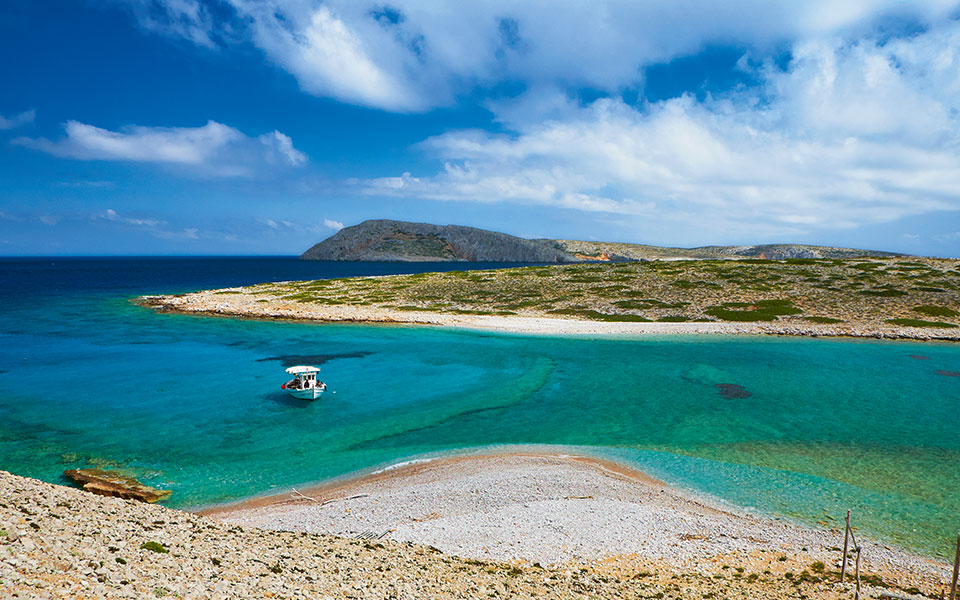
The islet of Koutsomitis on Astypalea.
© Perikles Merakos
In the following interview with Kathimerini newspaper, the minister who was assigned the tourism portfolio at the start of the month reveals the first – with an American carrier – of several deals that are in the works for extending the season of flights to Greece and an agreement for opening connections to the British market at the start of next year, as well as plans to intensify advertising of the Greek destination at the international level.
He talks about the development of new destinations and plans to enhance city break travel, while outlining the tools – which include incentives and counterincentives – that will be employed to combat the overexploitation that threatens certain destinations, while also referring to the investments and other interventions that will be required.
Kikilias further divulges that talks are under way with international groups such as Accor for the creation of a high-caliber tourism education center in Greece. He also stresses that the issue of biodiversity is at the top of the government’s and the prime minister’s agenda, which seeks to position Greece as a world leader in the field as tourism recovers from the pandemic slump. For this year, he estimates that Greece will see around 50% of the tourism activity it enjoyed in 2019, with revenues possibly of around 10 billion euros.
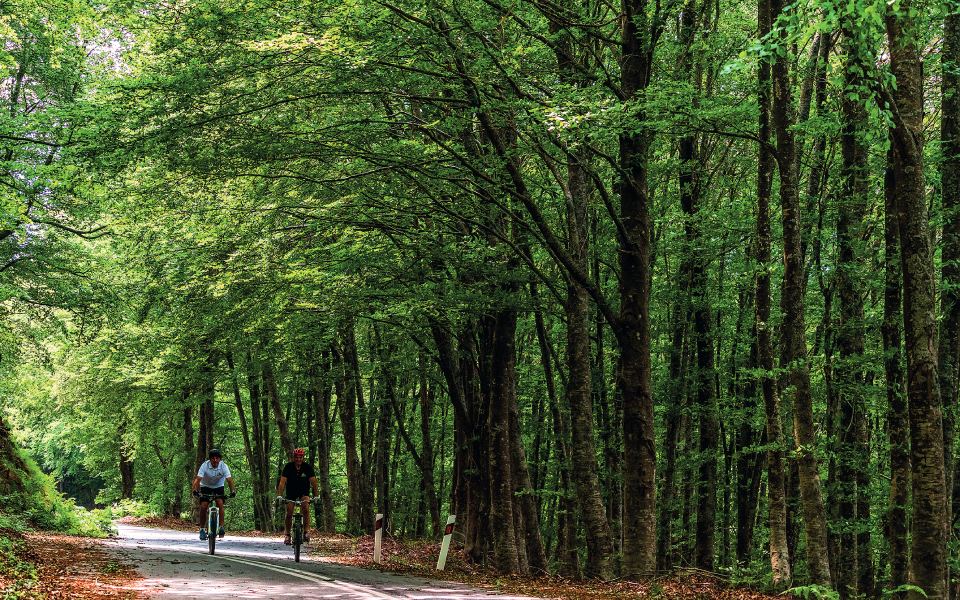
Mt Holomon at Halkidiki
© Perikles Merakos
As things stand right now, how do you see the year evolving in terms of tourism compared with 2019?
This year has brought a positive surprise: Our initial, but also ambitious, estimated target was to reach 50% of 2019, but all the data indicate that we will surpass it. It’s worth mentioning that according to data from the Bank of Greece, travel revenues in July reached €2.27 billion. This corresponds to 61.4% of the revenues of July 2019 when they amounted to €3.7 billion. Visitor arrivals from abroad increased by 240.2% compared to the same month in 2020. The data for August and September will further improve the overall picture.
The locomotive of the Greek economy gave the decisive boost to growth, and this should be credited to the people of the tourism industry, the entrepreneurs, the hundreds of thousands of employees and all those involved in this super-product called “Greek Tourism.” Industry experts are estimating revenues close to €10 billion for this year.
And allow me to add something equally important: The quality indicators have also improved, something that pleases us as, apart from the number of visitors, the qualitative increase was and remains a key factor. Based on these facts and provided we leave the pandemic behind, the goal for 2022 is to offer a unique tourist experience. This will not only be reflected quantitatively but also qualitatively, in the tourism GDP, in the new jobs that will be created, in the arrival of new visitors that hopefully will return to the lengthening of the season.
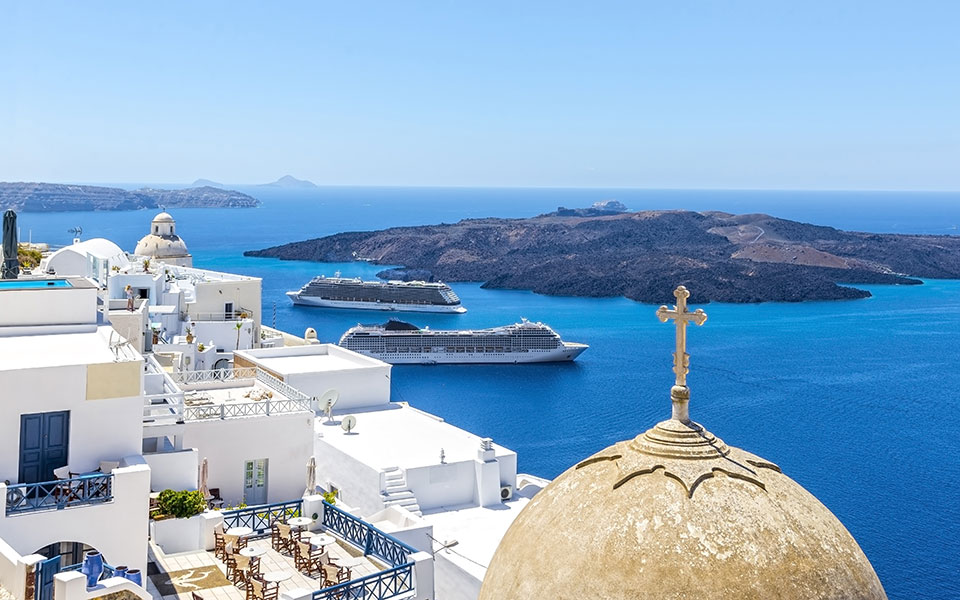
© Shutterstock
Greece is the number one tourism destination for more and more foreign travelers. How can the country maintain this momentum and even build on it?
Indeed, we see that apart from our traditional markets, new markets are included in the pool of visitors who choose Greece for their holidays, such as the Gulf countries and Israel. In order to maintain and strengthen this trend of an increasingly enlarged market, we must rely on two pillars: Firstly, the preservation and enhancement of the quality of our offered tourist product, especially where there are issues of intense seasonality and durability of our infrastructure, and, secondly, the emergence of the different experiences and different destinations that Greece offers to its potential visitors. The wealth of the country, from its cultural heritage to its unparalleled natural beauty, must be preserved within the framework of the principles of sustainable development, while at the same time our destinations that are less known to foreign visitors, but equally attractive, must be highlighted and gradually integrated into their choices.
We are seeing an increase in revenues from arrivals, a fact that points to a higher caliber of tourism. Can Greece maintain and further improve this profile?
I mentioned earlier the improvement in the quality indicators that are – allow me to say – more important than the absolute number of arrivals. We need to overcome the one-dimensional perspective of the number of millions of arrivals and take account of other indicators as well. This year the average expenditure of foreign visitors has increased by more than 20%, now every visitor spends more than €600. Even if it is also due to the current situation, this indicator must remain on the upside. As upward should be the indicator regarding the length of stay. At the same time we are seeking to lengthen the tourist season – a crucial element of the equation for sustainable growth in the tourism sector. To state a recent example: In our contacts with US executives, we have ensured that flights to Greece remain operational until at least the end of this season. We won’t stop here and we’ll try to lengthen the season further.
At the same time, through talks with the CEO of Jet2, the UK’s largest tour operator, we came to an agreement to open the season to Greek destinations earlier and to include, for the first time, Athens in those destinations.
Within this framework we plan to reallocate our marketing budget through the Greek National Tourism Organization (GNTO) to include fall and winter months respectively, promote mountain destinations and strengthen year-round hotels. At the same time we want to boost city break tourism in large cities, as city hotels were the most affected by the pandemic.
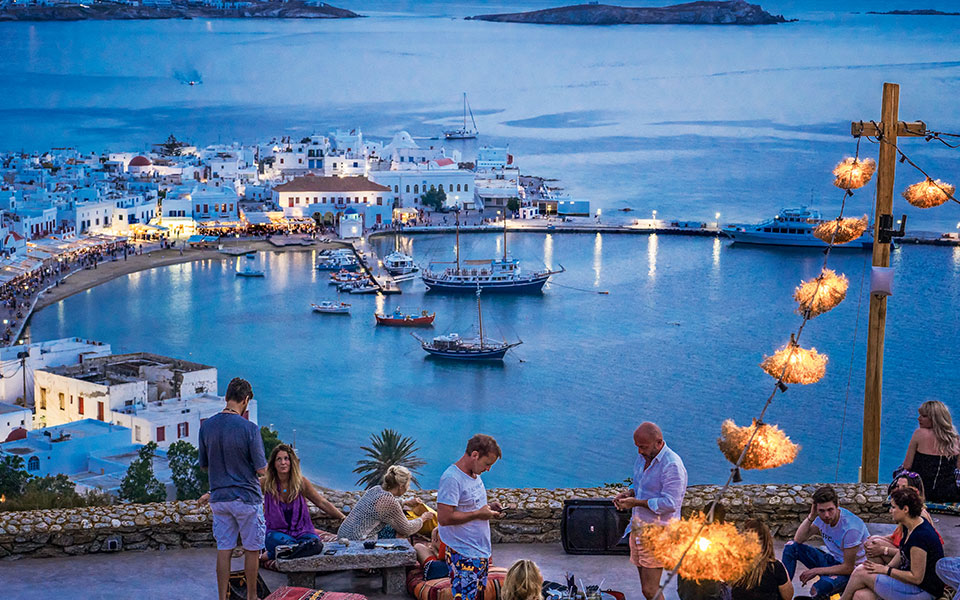
The ever-popular Hora of Mykonos.
© Perikles Merakos
You – and the prime minister, of course – have spoken of the need for a new tourism model that will uphold the principles of sustainability and protection of destinations’ characters, but also for a greater distribution of benefits to more parts of the country over a longer stretch of the year. How do you hope to accomplish this?
Allow me to start with the second part of the question. I have already mentioned that from a strategic point of view the further growth of tourism must be based on the expansion of destinations. But the potential visitor will not discover those by himself, nor will he look for hidden “treasures.” This is our obligation and in order to achieve that goal, a coherent way of presenting and promoting is required. The information already exists out there but that is not enough as it is scattered through various channels. We want to build a network that will inform market players abroad about what will happen in the context of the many thematic tourism actions that take place in Greece. But also in terms of geographical targeting we give special emphasis to mainland Greece and the lesser-known islands, based on the preservation of authenticity and the differentiation they offer the traveler. These in combination with the emergence of alternative forms of tourism, which, contrary to popular belief, bring high added value to the entire spectrum of the Greek economy, are our main tools.
On the issue of sustainability, it is a priority of both the government and Prime Minister Kyriakos Mitsotakis, who emphasizes the development of a strategy that puts biodiversity at the heart of tourism planning. I am very satisfied because I find that institutional bodies such as the Ηellenic Chamber of Hotels, which prepares a certification plan for hotels based on sustainability, as well as the Association of Greek Tourism Enterprises (SETE), are moving toward that direction.
The example of Santorini in Greece and Venice οn a European level are classic examples of the problems that phenomena of hypertourism may create, especially during peak periods. We will soon be able to present a program of incentives and disincentives with the aim to deter such issues.
But because you mentioned cruises, let me remind you that in the context of the Thessaloniki International Fair I had the opportunity to see the port and discuss extensively the project of Thessaloniki as a home port and hub destination. The benefits will not only be limited to the great growth impact in the city but will significantly enhance the tourism potential in the wider area. The combination of the new international airport with cruises could change the map.
According to research by diaNEOsis, Greece could receive €1.3 billion from cruises, while although we are the fourth most popular destination in the sector, we are in eighth place in terms of countries’ revenues stemming from this activity. In the pre-pandemic years, Spain and Italy had received and continue to receive more than double the revenues from each cruise passenger compared to Greece. This has to change and we have the opportunity to succeed, through new infrastructure, interconnection with modern airports and a tourist experience that will integrate all forms of tourism. The advantage of Greece is the many and different options that each visitor has depending on his preferences and interests.
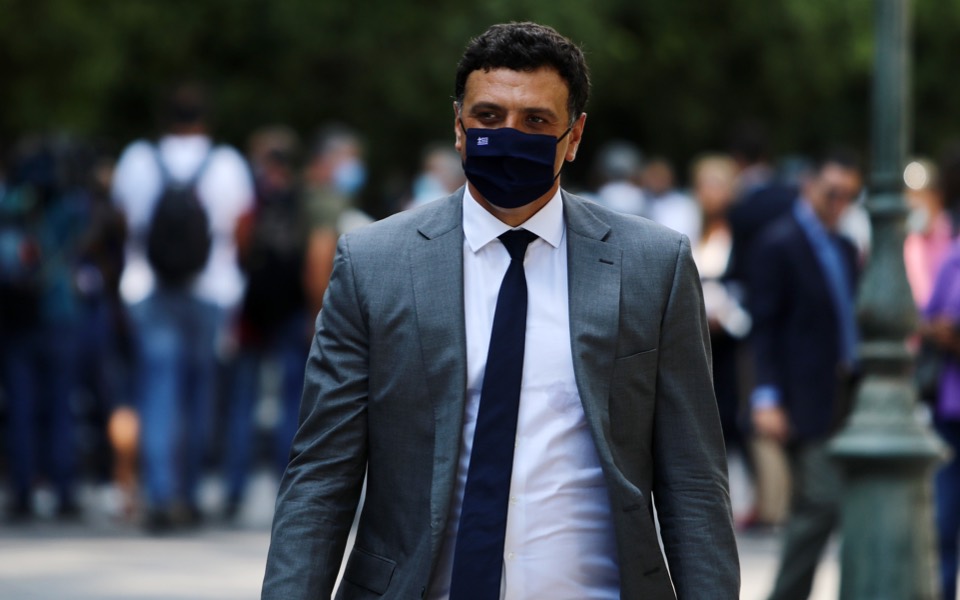
© Intime News
Are you considering strategic alliances with major foreign groups such as TUI or Accor, for example, which could help us elevate tourism education and training and/or attract more high-added value investments in tourism infrastructure?
Reskilling and upskilling of the tourism sector is a critical point, hence it is a priority. Given the fact that directly or indirectly about 1 out of 4 euros comes from tourism and the investments that are made or will be made in the near future, we will face the need for many employees. A significant percentage of those concern highly specialized jobs and therefore well paid. In this context, exploratory contacts are already being carried out with important foreign institutions. There is already an initial intention of Accor, one of the largest hotel groups in the world, to establish an international tourism training center in Greece.
Given that you’ve taken over at the Tourism Ministry in the second half of the government’s term, do you feel that you have a sufficient amount of time to implement your policies?
As Bismarck said, politics is the art of the possible, the attainable. During the 18 months of the pandemic, we implemented significant reforms, we strengthened the National Health System, we designed a solid vaccination program, policies that under normal circumstances would take decades to have been completed. We have shown that we can act fast and with steady steps forward. This is my intention for tourism as well.
This article was previously published at ekathimerini.com.
Before passports and package tours, pilgrims...
Tourists share the highs and lows...